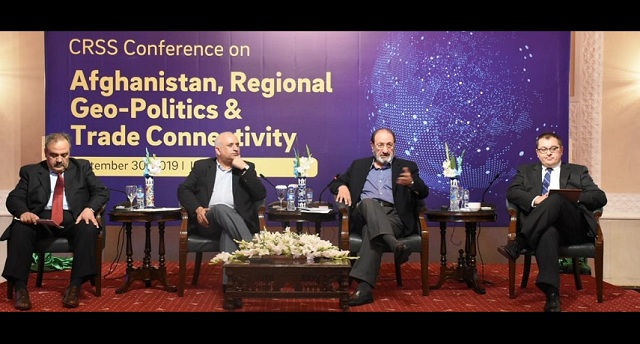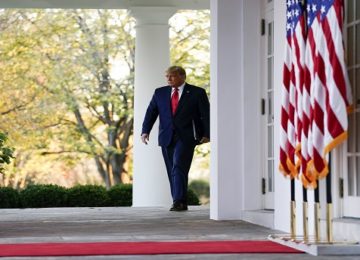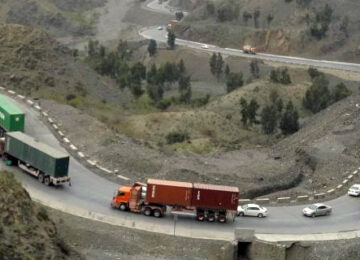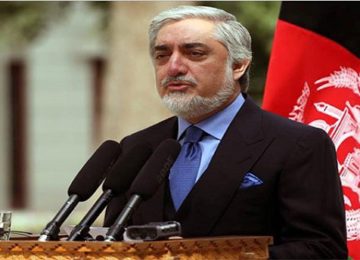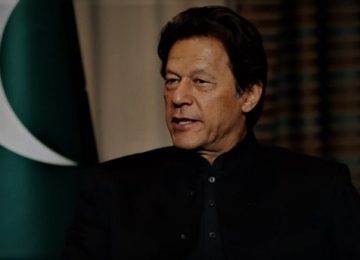October 1, 2019
The world is moving into a new geographical market and it is championed by China; Asia is the new economic center of gravity and Pakistan is at the cross-roads of regional economic connectivity. Former Minister of state and Chairman of Pakistan’s Board of Investment (BoI), Haroon Sharif, believes Pakistan has a geographical edge over other regional countries, but where do we fail? Our problem is that we outsource our thinking either to China or the International Financial Institutions (IFIs); our diplomats are great, but they need to be sitting in Beijing, Kuala Lumpur and Tashkent, rather than sitting in Geneva and New York. Haroon Sharif was speaking at an international conference on Afghanistan, Regional Geo-Politics and Trade connectivity with experts from US, China, Afghanistan and Pakistan, organized by the Center for Research and Security Studies (CRSS) in Islamabad today.
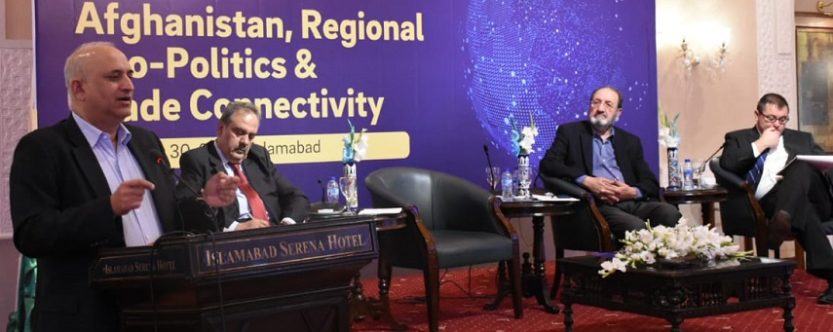
He further added that there is a major misconception about trade; relationships grounded on trade are the most fragile. “We should not overemphasize trade and connectivity. Rather, it should be trade and investment. When you have investment, only then you have mutual stakes, that’s when you work together”, he stated.
Intizar Khadim, DG Center for Development and Peace Studies (CDPS), while shedding light on Afghanistan’s role, stated that the war-torn country has always been at the center of geo-politics as it lies at the cross-roads of regional connectivity. In this age of connectivity, a new term has emerged recently i.e., ‘glocalized’ – not to be mixed with ‘globalized,’ he clarified. Today’s human is global and local at the same time. So, there has to be a mixed approach; just imposing an alien approach to an indigenous problem won’t solve it; it has not worked so, particularly in Afghanistan, he said. The problems of Kabul are not exclusive in nature; all regional countries share the risk. As no one can live in isolation, the instability in Afghanistan will have negative spill-over effects across the region if not curtailed, he said.

“I would recommend to the world community to not exclude any country; neither Pakistan, nor Iran, nor India nor Qatar. Incentivize them and utilize their role in the region” Khadim proposed. “We all embark in the same ship. We have the same destination. How we interact with each-other in the ship will determine the course of our voyage.”
Giving the Chinese perspective, Zhou Shuai, Lecturer at Beijing International Studies University, China, enunciated that the Belt and Road Initiative (BRI) is the global vision of infrastructural connectivity and a conception of 21st century multi-polarity. It would not be an exaggeration to state that it is one of the most significant game-changing endeavors to ever be attempted in the contemporary times. The economic pull of BRI works as an irresistible magnet to exploit its regional connectivity in stimulating the trade objectives, whether it is furthering bilateral trade with China such as the European Union (EU), Mideast, and African states may naturally be interested in, or in procuring an expedient outlet to the Indian Ocean such as what Russia and the Central Asian republics desire. Hence, through this endeavor, the BRI ensures regional as well as global economic development, Shuai said.
Further, BRI/Maritime Silk Route initiative of China is worth more than 900 billion USD. Over 20 countries involved in this grandiose and striving project BRI/Maritime Silk Road will provide access for China’s domestic overcapacity and capital for regional infrastructure development.
Zhou also shed some light on the misperceptions about Belt and Road Initiative (BRI). He stated that in contrast to the common perception, China is not the center of BRI; it wishes to provide an economic network where every country is equal. It is open for everyone to join. Secondly, it is purely an economic venture, not one which is security driven, he explained.
While presenting the Pakistani perspective on the regional situation revolving Afghanistan, Ambassador Asif Durrani was of the view that Afghanistan needs a leadership that gathers all tribes and factions under one flag. It also needs to revive the Jirga system at the national level for peace and development. The people of Afghanistan live their lives similar to the tribal structure of the 18th century which needs simple solutions based on firm principles. In contrast, what is being imposed on Afghans are Harvard styled models that look good in theory but have failed miserably in reality. The country needs indigenous solutions catering to the local needs which are effective and sustainable. He further stated that had it not been for the Cold War, there would not be turmoil in Afghanistan today.

Explaining the US stance on the regional dynamics and the Afghan war, former Intizar Khadim, stated that the US has many lessons from its military intervention in Afghanistan, one being that its leverage is now a deteriorating asset; it could have made better deals with the Taliban in the past than it is in any position to do so now. Further, the US has suffered from unclear objectives which were failed to be articulated as well as resourced.
“I hope that we can form a positive relationship which is favorable to Pakistan, Afghanistan & US’ interests. I hope we talk about market economy, climate change, education, and find more ways to work together”, he concluded, nevertheless.
Is US really serious about harnessing peace in Afghanistan or is it interested in the instability of the country, doubted Ambassador Ayaz Wazir who was chairing the session. Clearly, peace in the region is not without any strings attached to Afghanistan. As Pakistan’s national poet Allama Iqbal once mentioned, “if you take Asia as the human body, then Afghanistan in that is the heart. When the heart is sick, the whole body is sick. Now, here the heart is seriously sick. How can anyone think of economic connectivity when the gateway is closed,” he said. Restoring peace in Afghanistan is certainly in the interest of Pakistan more than anyone else. When peace will begin, economic activities will begin, he affirmed.
Commenting on the security situation in Afghanistan, Lt. Gen (retd) Asif Yasin Malik, while chairing a session, stated that just a few days ago, Afghanistan was on the brink of achieving peace; hence, showing optimism in what has seemed like a stalemate for years. Terrorism is nothing but a state of mind and the Afghans need to challenge this kind of mindset with a singular focus, he stated. Nothing is impossible if the Afghans resolve to solve their issues collectively, he concluded.
He went on to say that now the west is crying over the Belt and Road Initiative (BR) with claims that it is exploiting the region, but what about all the international financial institutions that have been plundering the poor nations since decades? It is just that when an alternative to the western policies is proposed, the west starts to have a problem, he said. However, he clarified that the BRI is revolving around the security of China too; while not militarily, but economically, and the best kind of security is economic security. The main beneficiary of BRI will be China & other countries will only become a part of that development, he said.



